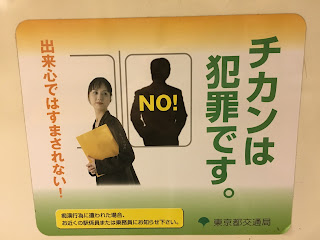 |
| A poster at station pointing out that "Chikan" is a crime |


 One very visible measure has been the introduction of women-only (josei-senyō =女性専用) train carriages during rush-hour (see pictures left). Moreover, posters like the one above are prominent at stations and on trains (the caption on the left of the poster says, "passing fancies/sudden impulses (dekigokoro) will not be excused"). Today, riding on the JR Chuo Line, I watched a video with a similar message. Actually, despite the poster declaring that chikan is a "crime", most incidents are punished not as criminal offences but as violations of the ANO or Anti-Nuisance Ordinance (meiwaku bōshi jōrei =迷惑防止条例), a local law to protect (only) women enacted by each individual prefecture. Punishment is typically a fine of ¥500,000. Only a few of the most serious incidents are treated under 176 of the Criminal (Penal) Code dealing with indecent assault (kyōsei waisetsu) which allows for a prison sentence of up to ten years. Data from the 2016 police white paper (p.106) for 2015 lists 3,206 arrests under the ANO (inside and outside trains) and 278 under the penal code (inside trains only). However, this is undoubtedly the tip of the iceberg: some surveys have suggested that as many as 90% of incidents are not reported.
One very visible measure has been the introduction of women-only (josei-senyō =女性専用) train carriages during rush-hour (see pictures left). Moreover, posters like the one above are prominent at stations and on trains (the caption on the left of the poster says, "passing fancies/sudden impulses (dekigokoro) will not be excused"). Today, riding on the JR Chuo Line, I watched a video with a similar message. Actually, despite the poster declaring that chikan is a "crime", most incidents are punished not as criminal offences but as violations of the ANO or Anti-Nuisance Ordinance (meiwaku bōshi jōrei =迷惑防止条例), a local law to protect (only) women enacted by each individual prefecture. Punishment is typically a fine of ¥500,000. Only a few of the most serious incidents are treated under 176 of the Criminal (Penal) Code dealing with indecent assault (kyōsei waisetsu) which allows for a prison sentence of up to ten years. Data from the 2016 police white paper (p.106) for 2015 lists 3,206 arrests under the ANO (inside and outside trains) and 278 under the penal code (inside trains only). However, this is undoubtedly the tip of the iceberg: some surveys have suggested that as many as 90% of incidents are not reported.
 Under-reporting is compounded by a dominant narrative in the media about "false accusations" known in Japanese as enzai (冤罪). For example, see here for a recent Asahi Television programme hosted by Beat Takeshi. Moreover, a case in early June in which a male passenger was accused but exonerated by fellow passengers received a lot of media attention. One of the most famous cases was Koji Yatabe who had his conviction over-turned after many months in custody and a two-year legal battle to prove his innocence. The 2006 film "I just Didn't Do it" (それでも僕はやっていない), pictured above right, is based on his case; he also wrote a book (bottom right) together with his wife. It is difficult to know how many enzai cases there actually are; perpetrators tend to be rather devious (there are even "how to" manuals) and position their bodies so that they won't be suspected. Moreover, it is possible that a shocked victim in a crowded train could misidentify her attacker. As a man, I can testify that the fear of being falsely accused is very real and riding a crowded train demands one keep one's hands in full view all the time. Nevertheless, the dominance of this discourse - coupled with the lack of victim voices in the media and the failure to label it as sexual assault - disguises the fact that sexual violence remains a far too common occurrence in a rapidly changing, but still very patriarchal, society.
Under-reporting is compounded by a dominant narrative in the media about "false accusations" known in Japanese as enzai (冤罪). For example, see here for a recent Asahi Television programme hosted by Beat Takeshi. Moreover, a case in early June in which a male passenger was accused but exonerated by fellow passengers received a lot of media attention. One of the most famous cases was Koji Yatabe who had his conviction over-turned after many months in custody and a two-year legal battle to prove his innocence. The 2006 film "I just Didn't Do it" (それでも僕はやっていない), pictured above right, is based on his case; he also wrote a book (bottom right) together with his wife. It is difficult to know how many enzai cases there actually are; perpetrators tend to be rather devious (there are even "how to" manuals) and position their bodies so that they won't be suspected. Moreover, it is possible that a shocked victim in a crowded train could misidentify her attacker. As a man, I can testify that the fear of being falsely accused is very real and riding a crowded train demands one keep one's hands in full view all the time. Nevertheless, the dominance of this discourse - coupled with the lack of victim voices in the media and the failure to label it as sexual assault - disguises the fact that sexual violence remains a far too common occurrence in a rapidly changing, but still very patriarchal, society.UPDATE: June 2023 saw further revisions to the penal code (see here and here). The foreign media paid most attention to raising the age of consent from 13 to 16, although in reality various other national laws and local ordinances already forbade sexual acts with children under 18. Much more significant in the new revisions were the clarification of rape prosecution requirements which for the first time define rape as “nonconsensual sexual intercourse” (同意のない性行為=dōi no nai seikōi) finally moving beyond the "violence and intimidation" (physical force) requirement.